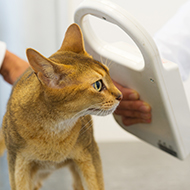Ministers back feline microchipping campaign

"We were delighted to have welcomed so many politicians online to discuss this important animal welfare issue" - Jacqui Cuff, Cats Protection.
Animal welfare campaigners have expressed their delight after ministers backed a campaign calling for compulsory microchipping of pet cats.
Leading feline welfare charity Cats Protection has been calling for microchipping to become compulsory for pet cats, as it already is for dogs. Indeed, a petition launched by the charity has garnered more than 36,000 signatures.
Last week (20 October), the charity held a virtual event for politicians to discuss how microchipping could significantly improve feline welfare in the UK. The event was attended by more than 50 MPs and peers from across different parties, including animal welfare minister Zac Goldsmith.
Cats Protection’s head of advocacy and government relations Jacqui Cuff said: “Microchipping is an essential part of responsible pet ownership, and is already compulsory for dogs. Ensuring microchipping is compulsory for cats would give them the same level of protection and improve their welfare.
“We were delighted to have welcomed so many politicians online to discuss this important animal welfare issue and look forward to working together in the future.”
According to figures from the latest CATS (Cats And Their Stats) report, there are more than 2.6 million cats in the UK that are not microchipped.
Earlier this year, the government launched a call for evidence to understand the consequences of making microchipping of cats compulsory in England. This included how microchipping all cats would apply to feral or stray cats, how the government could make and enforce the rule and experiences with compliant microchip databases.
Ministers are expected to consult on this issue before the end of 2020.



 The Veterinary Medicines Directorate (VMD) is inviting applications from veterinary students to attend a one-week extramural studies (EMS) placement in July 2026.
The Veterinary Medicines Directorate (VMD) is inviting applications from veterinary students to attend a one-week extramural studies (EMS) placement in July 2026.